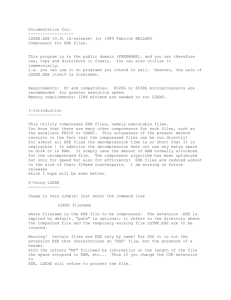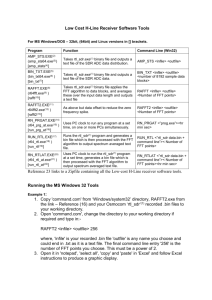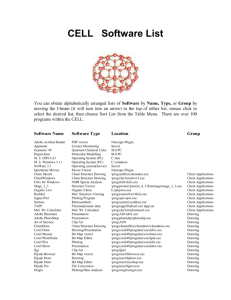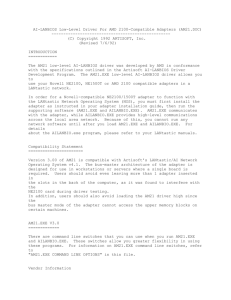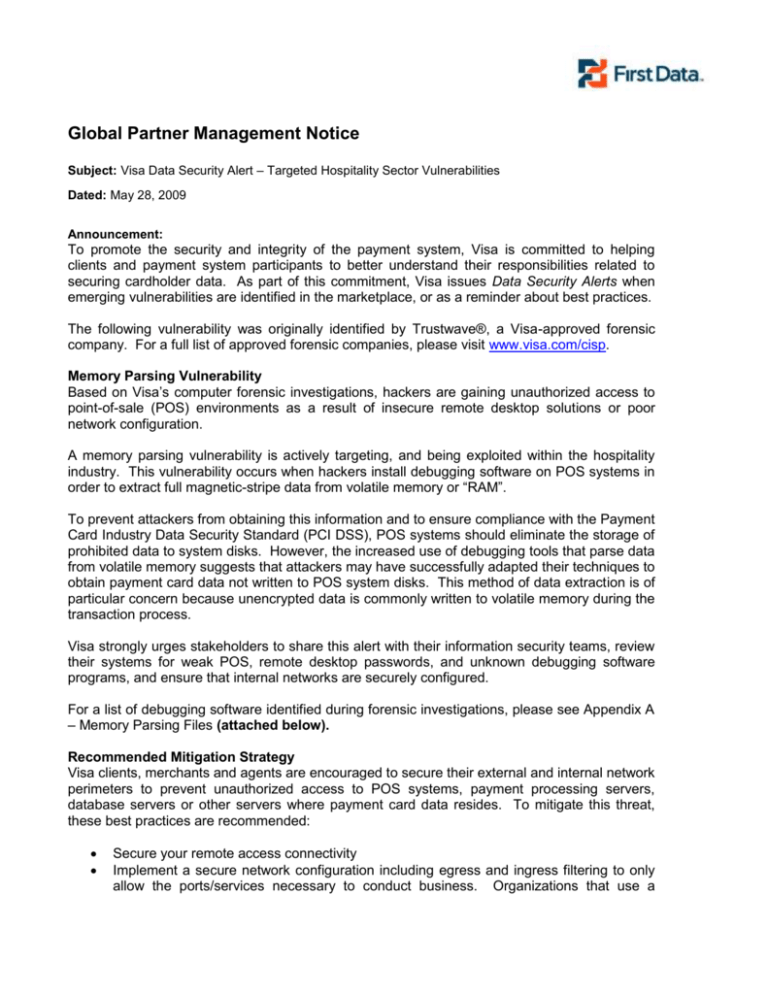
Global Partner Management Notice
Subject: Visa Data Security Alert – Targeted Hospitality Sector Vulnerabilities
Dated: May 28, 2009
Announcement:
To promote the security and integrity of the payment system, Visa is committed to helping
clients and payment system participants to better understand their responsibilities related to
securing cardholder data. As part of this commitment, Visa issues Data Security Alerts when
emerging vulnerabilities are identified in the marketplace, or as a reminder about best practices.
The following vulnerability was originally identified by Trustwave®, a Visa-approved forensic
company. For a full list of approved forensic companies, please visit www.visa.com/cisp.
Memory Parsing Vulnerability
Based on Visa’s computer forensic investigations, hackers are gaining unauthorized access to
point-of-sale (POS) environments as a result of insecure remote desktop solutions or poor
network configuration.
A memory parsing vulnerability is actively targeting, and being exploited within the hospitality
industry. This vulnerability occurs when hackers install debugging software on POS systems in
order to extract full magnetic-stripe data from volatile memory or “RAM”.
To prevent attackers from obtaining this information and to ensure compliance with the Payment
Card Industry Data Security Standard (PCI DSS), POS systems should eliminate the storage of
prohibited data to system disks. However, the increased use of debugging tools that parse data
from volatile memory suggests that attackers may have successfully adapted their techniques to
obtain payment card data not written to POS system disks. This method of data extraction is of
particular concern because unencrypted data is commonly written to volatile memory during the
transaction process.
Visa strongly urges stakeholders to share this alert with their information security teams, review
their systems for weak POS, remote desktop passwords, and unknown debugging software
programs, and ensure that internal networks are securely configured.
For a list of debugging software identified during forensic investigations, please see Appendix A
– Memory Parsing Files (attached below).
Recommended Mitigation Strategy
Visa clients, merchants and agents are encouraged to secure their external and internal network
perimeters to prevent unauthorized access to POS systems, payment processing servers,
database servers or other servers where payment card data resides. To mitigate this threat,
these best practices are recommended:
Secure your remote access connectivity
Implement a secure network configuration including egress and ingress filtering to only
allow the ports/services necessary to conduct business. Organizations that use a
MultiProtocol Lambda Switching (MPLS) topology for shared network and protocol
switching should take steps to secure their MPLS environments. View the Complete
Guide for Securing MPLS Networks on ZDNet.com
Utilize host-based Intrusion Detection Systems (IDS)
Monitor firewalls for suspicious traffic (particularly outbound traffic to unknown
addresses)
Implement file integrity monitoring
Secure systems so that unauthorized software cannot be installed
Ensure that all anti-virus and anti-spyware software programs are up-to-date
Routinely examine systems and networks for newly-added hardware devices; unknown
files and software
Periodically reboot your POS systems to clear volatile memory
If you detect a suspected or confirmed security breach, notify your acquiring bank
immediately.
Appendix A – Memory Parsing Files
Source: Visa Business News, May 20, 2009
.Appendix
A – Memory Parsing Files
File name
Purpose
File size
MD5/SHA-1 Hash(s)
1f9d0d200321ad6577554cc1d0bb6b69
ec137291dd52a3a2de246f22d3cbc7f0
csrsvc.exe
Memory dumper
b4f28e51ec62712951ee6292936768c8
8bfa2c3e089c10bc39ae6d0d41e4acf211318db4
MemPDumper.exe
Memory dumper
75,264
f3f932ba44007e130c61da789f72163b
75,776
dbaab511f2210228e41c3ffdbe5d3fce
bf27e87187c045e402731cdaa8a62861
dnsmgr.exe
Track data parser
dirmon.chm
Output file from track data parser
programs
WinMgmt.exe
Calls csrsvc.exe and dnsmgr.exe
and runs an interactive command
shell on tcp port 3373
04da2210591489494b498944084d47e6
1,162,117
55b9ba26bf854e9f2893841129afc457
39,560
ac15d275d4d01c453aab907da7051f81
3e19ef9c9a217d242787a896cc4a5b03
c95a12932b1bfc85270f3fedc9d7b146
66,048
install.bat
Batch file that installs WinMgmt
as a Windows service
6ad25d1cb1bb86186d2a516dd0af6da9
a7c24031cae3f29ec0c30d220c52a087
43
a7c24031cae3f29ec0c30d220c52a087
dump.bat
Batch file that installs memory
dumper program on a single
computer
267
9393aaf96f3fc25bfcc6649e33edc560
135,168
579b43e13294eb85faa7c28b470b19c1
psexec.exe
Sysinternal tool used to run
process on remote machines
play.bat
File calls install.bat file to install
memory dumper on multiple
systems
79
fcb37de3b9b1c831a52a836b7a2f2695
Far.exe
DOS-based file manager used by
attacker
620,032
d1d9c26a77beb82b13c82e854042dc92
compenum.exe
Network scanner that outputs a
list of accessible systems
54,272
bcc61bdf1a2f4ce0f17407a72ba65413
shareenum.exe
Network scanner that outputs a
list of accessible shares
53,248
3ca6ec07c6b840e7a256d09839ba0c4f
Best Regards,
Global Partner Management Team
First Data Corporation
Email: Gpm@firstdata.com
© 2009 First Data Corporation. All Rights Reserved. All trademarks, service marks and trade names referenced in
this material are the property of their respective owners. The information contained herein is provided as a courtesy
and is for general informational purposes only. This Alert is not intended to be a complete description of all applicable
policies and procedures. The matters referenced are subject to change. Individual circumstances may vary. This
Alert may include, among other things, a compilation of documents received from third parties. It should not be used
as a substitute for reference to, as applicable, association releases, bulletins, regulations, rules and other official
documents. First Data shall not be responsible for any inaccurate or incomplete information. This Alert may not be
copied, reproduced or distributed in any manner whatsoever without the express written consent of First Data
Corporation.





